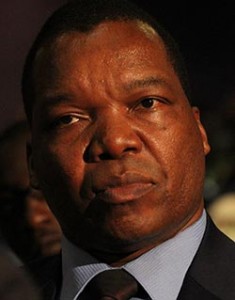
(image via Getty)
Imagine having your home invaded by an armed criminal, escaping with your nine-year-old child, having the police show up to apprehend the criminal, watching for 19 hours as the police systematically destroy your home, and having the state deny you just compensation for your troubles afterwards.
If doesn’t sound like something covered under the Fifth Amendment’s “Takings” clause, then the Fifth Amendment needs to be amended.
Maybe one day it will be, but for right now Colorado man Leo Lech is out of luck. The Tenth Circuit ruled that the police action which destroyed his home is not a Taking, and thus he’s not entitled to any remedy from the city or state. The Washington Post has the story:
The suspect, Robert Jonathan Seacat, had stolen a shirt and a couple of belts from a Walmart in neighboring Aurora, Colo., and then fled in a Lexus, according to a police affidavit. A police officer pursued him in a high-speed chase until Seacat parked his car near a light rail station, hopped a nearby fence leading to the interstate, and then crossed five lanes of traffic on foot. He climbed the fence on the other side — and then, shortly thereafter, came upon the Lech residence.
A 9-year-old boy, John Lech’s girlfriend’s son, was home alone at the time, waiting for his mom to return from the grocery store, Lech said. He told police he was watching YouTube videos in his room when he heard the alarm trip, according to the affidavit. He emerged to find a man walking up the stairs, holding a gun. “He said, ‘I don’t want to hurt anybody. I just want to get away,’ ” Lech said. Minutes later, the boy walked out of the house unharmed…
Thus began the 19-hour standoff.
“They proceed to destroy the house — room by room, by room, by room,” Lech said. “This is one guy with a handgun. This guy was sleeping. This guy was eating. This guy was just hanging out in this house. I mean, they proceeded to blow up the entire house.”
I’ve watched action movies, I know how this goes. The cops have the criminal surrounded but the bad guy is well defended. Mel Gibson saunters in with a rocket launcher. The property owner, Shooter McGavin, shouts “CAREFUL! My Ming Dynasty vase is worth more than your entire family!” Mel Gibson fights his way through the house, destroying everything but the vase, finally cornering and arresting chief henchman Tony Todd. Just then, trainee Michael Cera comes busting through the fourth wall in a bulldozer. The vase topples over. Later, back at the station, police chief Jeffrey Wright — seen looking over a bill — chews out Gibson and Cera for the wanton destruction that is costing the city millions. Fellow officer Kiefer Sutherland, who is actually the mole and the real criminal mastermind, is seen consoling McGavin with a giant check.
Except in real life, there is no check. Shooter McGavin never gets paid. The Takings clause doesn’t cover property destruction caused by law enforcement as they are trying to enforce the law. The Tenth Circuit explains:
[T]he Lechs urge us to disregard the distinction between the police power and the power of eminent domain in resolving this appeal. In support, they point out that “the Takings Clause ‘was designed to bar [g]overnment from forcing some people alone to bear public burdens which, in all fairness and justice, should be borne by the public as a whole.’” Aplt. Br. 13 (quoting Armstrong v. United States, 364 U.S. 40, 49 (1960)). And they argue that upholding the district court’s summary-judgment ruling would do just that: it would force the Lechs to bear alone the cost of actions the defendants undertook in an effort to “apprehend[] a criminal suspect”—actions that were clearly “for the benefit of the public” as a whole. Id. at 13, 33.
We do not disagree that the defendants’ actions benefited the public. But as the Court explained in Mugler, when the state acts to preserve the “safety of the public,” the state “is not, and, consistent[] with the existence and safety of organized society, cannot be, burdened with the condition that the state must compensate [affected property owners] for pecuniary losses they may sustain” in the process. 123 U.S. at 669. Thus, “[a]s unfair as it may seem,” the Takings Clause simply “does not entitle all aggrieved owners to recompense.” AmeriSource Corp., 525 F.3d at 1152, 1154.
Accordingly, we reject the Lechs’ first broad challenge to the district court’s ruling and hold that when the state acts pursuant to its police power, rather than the power of eminent domain, its actions do not constitute a taking for purposes of the Takings Clause. And we further hold that this distinction remains dispositive in cases that, like this one, involve the direct physical appropriation or invasion of private property.
I do not think that just compensation for the destruction of property unduly burdens the police in their pursuit of enforcement. It’s not like the officers have to pay for the damage out of their own pockets. The taxpayers do. And you don’t have to shroud yourself too darkly behind the veil of ignorance to imagine that taxpayers should want to share the collective burden of destruction pursuant to an arrest, as opposed to localizing those cost on one unlucky individual. However, if local and state officials were kind of sick of paying the costs of police property destruction, and that filtered down to the point where police were a little more cautious before destroying an entire house to catch a shoplifter, that would also be a good thing.
The Tenth Circuit appears to be right on its interpretation of Fifth Amendment precedent, which means I’m going to need (gulp) progressives and conservatives to help change the law here. That should be possible, right? Progressives are woke to the fact that police have entirely too much power to harm innocents without accountability, conservatives allegedly care when “big government” does anything to “mah property.” Surely we can reach some kind of broad consensus that if the cops shoot up your house because it was invaded by a criminal, the state should pay you back for it.
We should fix this. I can’t imagine James Madison thought it was okay for the government to nuke your house from orbit because a petty thief commandeered your kitchen.
Police blew up an innocent man’s house in search of an armed shoplifter. Too bad, court rules. [Washington Post]
Elie Mystal is the Executive Editor of Above the Law and a contributor at The Nation. He can be reached @ElieNYC on Twitter, or at elie@abovethelaw.com. He will resist.



 Jordan Rothman is a partner of
Jordan Rothman is a partner of 













